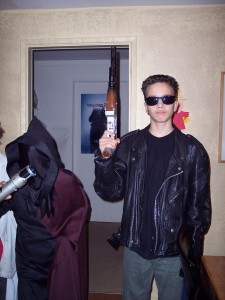The reasonable man adapts himself to the world: the unreasonable one persists in trying to adapt the world to himself. Therefore all progress depends on the unreasonable man. -George Bernard Shaw
Yesterday we went to our local Family Fun Center, where Nigel loves to drive the go-karts. As we were en route, the sky clouded up quickly, and it started raining before we even got there. When we pulled up, I looked over at the go-kart area and could tell that they were not running. “Well, guys, the go-karts are closed,” I announced. “That’s okay,” Nigel said. “We can go in the arcade.” Adaptability score: 1
I don’t know how Nigel filters out all the sounds, lights, and people in a busy arcade, but he does. I think it’s because it’s something that he really wants to do, so he’s motivated. Or, it could be because there’s so much going on that even his brain can’t isolate all the sights and sounds, and so it’s just one big bombardment to tune out. But somehow he’s learned to deal with it. Adaptability score: 2
Nigel, having a lower emotional age than other 14-year-olds, has always enjoyed climbing and sliding on play structures. You know, the indoor ones that usually have a height limit of 48 inches, which Nigel surpassed a few years ago. He sometimes rationalizes: “I can go on it because it’s not crowded.” But he is now at an age and size which makes it inappropriate for him to continue playing on the indoor play structures, and doing so could even get him in trouble with people who don’t realize that he’s an 8- or 9-year-old in a 14-year-old’s body. He could be seen as a threat. So, I figured it was time to break him of this habit. He asked, as he usually does at the Family Fun Center, if he could go in Cactus Jack’s Playhouse. I non-confrontationally posed that he might be too big for it, and I suggested that he ask if there was a height or age limit. He came back a moment later and said, “Twelve and up. And since I’m fourteen, I can go in.” “I think it’s twelve and under,” I said gently. “But I really like it,” he said in a quiet, forlorn voice. “I know, honey, but you have to realize it’s not built for kids your age.” He looked down and said, “Okay.” Then he looked up and asked, “Will you play air hockey with me?” Adaptability score: Bonus 10 points!
Such a “reasonable man” my son is becoming. And a good air hockey player, too!


